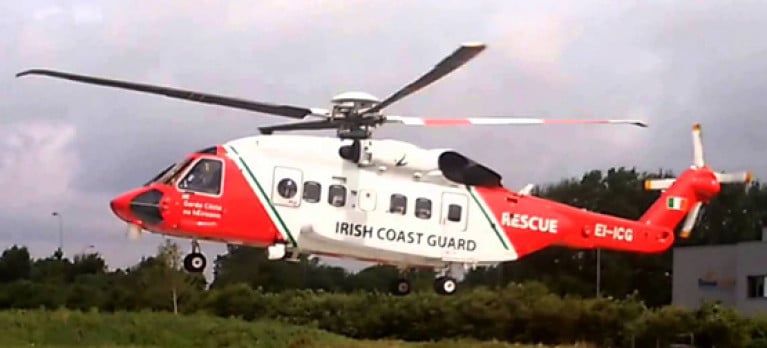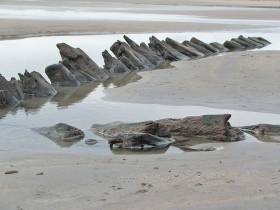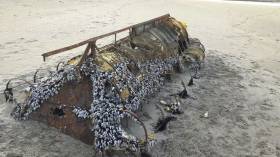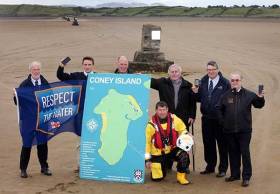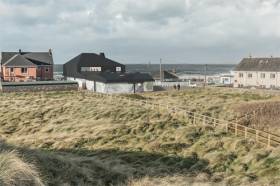Displaying items by tag: Sligo
While tracking vessels in the north-west today, among them passenger ferry Aran Islands Express, a trio of general cargo ships operated by Wilson ASA have been trading in the Port of Sligo at the weekend, writes Jehan Ashmore
The operator Wilson ASA has the largest short-sea fleet in Europe, with around 130 vessels ranging from 1500 to 8500 deadweight tonnes (dwt), all of similar design. Last month, Arklow Shipping as Afloat reported, sold a cargoship to the Norwegian competitor based in Bergen.
Of the three general cargo ships using the Port of Sligo, all are 2,000 dwt plus cargo ships and engaged in exporting fishmeal. The port operated by Sligo County Council is where infrastructure work has taken place to increase more business for the regional port.
Sligo is the only working port between Galway and Derry~Londonderry (Foyleport) and has two quays, the Deepwater of 77m and Barytes of 55m, where the port handles cargoes of coal, timber, fish meal, and scrap. Cargo ships of up to 3,500 dwt tonnes can be accommodated.
Berthed this morning was Wilson Lahn, of 2,484 (dwt) with the 2001 built cargo ship alongside the Deepwater Quay. The slightly larger Wilson Mosel (2,676dwt/1993) completed loading last night and set sail at first light this morning for Egersund, Norway.
The 82m length overall (LOA) cargo ship was tracked later, mid-morning off Co. Donegal while Wilson Lahn continues to be loaded today and is scheduled to depart tomorrow morning.
As for the third cargo ship, Wilson Thames (2,439dwt/2000) departed yesterday, and when passing in the channel the Wilson Lahn, while loading took place of the aforementioned Wilson Mosel.
Both Wilson Mosel and Wilson Thames berthed on Friday’s evening tide, while Wilson Lahn was sitting at anchor in Sligo Bay, having the previous day sailed from Kyleakin, Isle of Skye, Scotland. When at anchorage, the 83m cargo ship was waiting to berth on Saturday’s evening tide following the completion of loading fishmeal of the Wilson Thames and the departure of the 89m cargo ship, which is currently bound for Perth on the east coast of Scotland.
All of the similar long cargo ships are registered in Bridgetown, the capital of Barbados, and have blue hulls with Wilson in white lettering displayed amidships.
Sligo County Council to Pay €2,600 in Fines and Costs for Damage to Salmon Habitat
Inland Fisheries Ireland (IFI) has secured a conviction against Sligo County Council for damage caused to a tributary of a river linked to a Special Area of Conservation.
The incident happened at Carraun in Corballa, Co Sligo on a stream which flows into the Killala Bay/Moy Estuary Special Area of Conservation.
It involved machinery, commissioned by the council, driving through a river bed while carrying out road improvement works nearby.
The machinery crossed the stream a number of times, despite previous instructions from IFI to use an alternative route.
Sligo County Council was fined €250, must pay costs of €1,845 and has to pay €500 to IFI in respect of the expense of assessing restorative works.
Mary Walsh, director of IFI’s Western River Basin District, Ballina, said: “This work was overseen by the council, a large public body, and the habitat damage caused by machinery traversing the stream should never have taken place.
“IFI will continue to prosecute such illegal activity in fulfilment of our remit to protect and conserve Ireland's important inland fisheries resource.”
Prior to the commencement of proposed council works, consultation took place between an IFI senior environmental officer and a representative from Sligo County Council during which IFI clearly outlined the sensitivity of the watercourse on the site, and of the pollution mitigation measures required.
Despite this, damage was done to the river bed and the banks of a tributary stream of the Newtown River in April 2023.
The case was heard at Sligo District Court on Tuesday 6 February.
Walsh added: “Public bodies, contractors and landowners need to seek all necessary and relevant information from Inland Fisheries Ireland before carrying out any works near, or on, a watercourse.
“IFI encourage members of the public to report incidents such as this, and those of water pollution, fish kills, and illegal fishing to its 24/7 phone number, 0818 34 74 24.”
Landowners can refer to further guidance from Teagasc on minding Ireland’s watercourses.
A Sligo angler has been convicted of a breach of fisheries legislation for illegal salmon angling.
Mark Cawley, with an address in Sligo town, was observed in possession of an untagged salmon at Rockwood Parade on the Garavogue River in Sligo town.
The offence took place on 4 July 2022 and an Inland Fisheries Ireland (IFI) officer gave evidence in court.
Cawley was convicted at Sligo District Court on Tuesday 6 June. He was fined €250 for breach of Section 182 of the Fisheries (Consolidation) Act, 1959 — possession of salmon unlawfully captured.
He was ordered to pay costs to IFI of €675 and €106.66 in expenses.
Mary Walsh, director of the Western River Basin District said: “The Garavogue River is open to catch-and-release fishing only. Atlantic salmon stocks are in decline and they need to be protected.
“It is critical for all stakeholders to strictly abide by tagging regulations to safeguard the future of these valuable salmon fisheries.
“IFI actively pursue those who fish illegally. I commend the ongoing surveillance operations carried out by our fisheries protection officers in the district, which led to this conviction.”
Calls For Surfers To ‘Foot The Bill’ For Rescues During Storm Conditions After Two Taken From Water In Storm Jorge
Calls have been made for people rescued from the water while going against safety advice and weather warnings to be “handed the bill” for their rescue, after two surfers were saved off the Sligo coast during Storm Jorge at the weekend.
The Irish Times reports that the two surfers were winched aboard the Sligo-based Irish Coast Guard helicopter Rescue 118 on Saturday morning (29 February) after one had lost his surfboard and another on shore had attempted to rescue him.
Storm conditions such as those presented by Storm Jorge — which prompted a Status Red marine warning for all Irish coastal waters — create the swells sought after by the big wave surfers regularly attracted to the Sligo coast, particularly at Mullaghmore, over the winter months.
But the situation on Saturday did not sit well with members of the public commenting online, who branded the surfers’ actions as “selfish” and “nonsense” and demanded they foot “the bill” for the launch of emergency services, or even face criminal prosecution.
The Irish Times has more on the story HERE.
Sligo Group Promoting Armada Links Honoured By Spanish King
#SpanishArmada - A Sligo-based group dedicated to promoting the northwest coastal area’s links with the historic Spanish Armada has been honoured by the King of Spain in a special ceremony this week, as RTÉ News reports.
The Plate of the Order of Isabel La Católica, the highest civil order granted by King Felipe VI, was presented by Spanish Ambassador to Ireland José María Rodríguez-Coso to the members of the Grange and Armada Development Association (GADA) at Sligo Town Hall.
The first Irish recipients of the honour, recognising groups and individuals who foster relationships between Spain and the international community, have worked hard to promote and preserve the history of the three Spanish Armada ships that were wrecked at Streedagh in 1588.
Three years ago, an almost completely intact rudder from one of the armada ships was discovered on the beach at Streedagh. Following that a number of cannons and other ship artefacts were recovered on dives to the wreck sites.
And the search for more items from the shipwrecks is ongoing, with marine archaeologists’ latest survey of the area taking place over the summer, according to TheJournal.ie.
The event comes almost a year after the Spanish Navy sailed into Sligo town for the first time since the armada in 1588 for a ceremony in memory of that historic fleet, as previously reported on Afloat.ie.
Cuban Migrant Boat Found On Sligo Beach
#CoastalNotes - An unusual vessel that washed up in Co Sligo at the weekend has been traced thousands of kilometres across the Atlantic – to Cuba.
According to BBC News, Gordon Fallis was walking his dogs on the beach near the famous surfing hotspot of Mullaghmore when he discovered the dilapidated boat on the shore.
It appeared to be improvised from a metal frame and plastic bottles for buoyancy, covered in a yellow tarp, and powered by a repurposed car engine.
After posting photos of the strange boat to the Facebook group Lost at Sea, which attempts to identify such coastal finds, he was advised to take another look at the labels on the plastic bottles – which said they were from Cuba.
Such jury-rigged boats, nicknamed ‘chugs’ due to the sound of their straining motors, are commonly used by Cubans hoping to cross the Florida Straits for a better life in the United States.
It’s not the first unique find to wash up in the North West in recent months, following the Canadian houseboat that beached in Co Mayo this past November, as previously reported on Afloat.ie.
But never before has an improvised vessel from Cuba been discovered on this side of the Atlantic — a journey that could have taken anywhere from months to years.
BBC News has much more on the story HERE.
RNLI Launches Text Messaging Service to Prevent Dangerous Tidal Cut–Off at Coney Island in County Sligo
The RNLI has today launched an innovative free text message service aimed at preventing people getting caught out by dangerous tides when travelling to Coney Island in County Sligo.
In what is the first of its kind in Ireland, the RNLI text messaging service is being introduced by the charity in a direct response to a coastal safety risk identified by the local community in Sligo.
For years the causeway which provides access to Coney Island and the nature of its flooding tidal waters have presented a risk to the public who are unsure of the tide times and the appropriate times to cross from the mainland.
Sligo Bay RNLI has responded to numerous incidents around Coney Island that relate to tidal cut off and activities around the sandbanks and tidal channels. However, the volunteer lifeboat crews have often been restricted by water depth when attending these incidents especially during the crucial early phase of the flooding tide where people are starting to cut off or are bogged in.
It is hoped that the new text messaging system accompanied by signage directing people to the numbers to text, will encourage safer crossing and decision making.
Anyone planning to visit the island by car, bike or foot is encouraged to Text Coney to 53600 (from Republic of Ireland mobiles) or 81400 (from Northern Ireland/UK mobiles) to find out the safe crossing times for that day.*
The RNLI will reply with information on the best times subject to good weather conditions along with key safety messages reminding users to always leave extra time to return safely to the mainland, to never attempt to cross if the strand is covered with water and in the event of an emergency to dial 999 or 112 and ask for the Coast Guard.
Speaking at the launch of Text Coney today, Rogan Wheeldon, RNLI Community Incident Reduction Manager said: ‘This is a perfect example of a community on the coast identifying a risk and working collaboratively to help save lives at sea. By providing the public with the relevant information to make safer choices when accessing the coast it reduces their risk, the risk to our lifeboat crew, and also to those in the community that are putting their own lives at risk to help those in trouble’.
Joe Henderson, Sligo Bay RNLI Coastal Safety Officer added: ‘Over recent years our lifeboat crew at Sligo Bay RNLI has been called out many times to rescue people who have been caught out by the tide. As part of the RNLI’s work in prevention of accidental drowning we now have this wonderful texting system in place with good signage here at The Causeway and we really want to make people aware that is here and encourage locals and visitors alike to get texting when planning a visit to the beautiful Coney Island. We would like to thank everyone involved in bringing this development to fruition including the residents of Coney Island and Sligo County Council.’
The Text Coney launch comes a week after the RNLI launched Respect the Water, its annual national accidental drowning prevention campaign which will run throughout the Summer.
Respect the Water aims to highlight the risk of accidental drowning when people are near the coastline by encouraging safer behaviour both in and around the water.
The campaign is primarily aimed at males aged between 16 and 39 but the same advice is relevant for anyone visiting the coast.
The RNLI is warning of the key dangers that can lead to accidental drowning - cold water, unexpected entry into the water, and rip currents and waves.
Bold Design For New Strandhill Surfing Centre
#Surfing - A black rubber roof is one of the unusual features of the winning design for a new maritime centre in Strandhill, as the Sligo Champion reports.
The vision for the new surfing and coastal community centre by London architects Manalo & White also includes large concrete panels around the perimeter with Celtic seascapes and surfing scenes by Barry Britton, whose known as much for his art as for his waveriding legacy – not least being father of women's surfing pioneer Easkey Britton.
A planning application is expected to be completed by the end of April with a view to having the €500,000 facility, which would replace the existing centre used by the local surf club and other groups, ready in time for next year's tourism season.
The Sligo Champion has more on the story HERE.
Coast Guard Helicopter Bringing Christmas Cheer to Tory Island
The Sligo based Coast Guard helicopter, Rescue 118, is helping to bring Christmas cheer to Tory Island off the Donegal coast. Nine (9) islanders who otherwise would not have got home for Christmas are this afternoon being flown from Donegal Airport in Carrickfinn, to the island. A backlog of Christmas post and fresh supplies* for the island population were also carried on the flight.
The recent spell of bad weather which has extended into Storm Eva, has severely interrupted ferry services to and from the island resulting in few opportunities for locals to return home for Christmas. Deliveries of post and fresh goods have also been interrupted.
It has been a busy year for Coast Guard helicopters with almost one thousand missions completed to date by the service. This work includes assistance provided to HSE with patient transfer.
Over the Christmas period many people will be engaging in outdoor activities. The Coast Guard is strongly urging the public not to engage in any activity unless they have first checked that it is safe to do so; especially when planning to go on exposed coasts, cliffs, piers, harbour walls, beaches, promenades or other coastal areas.
The Coast Guard wishes to remind the public that if you see anybody in trouble at sea, on the coast or on cliffs to call 112 and ask for the Coast Guard.
New Atlantic 85 Lifeboat Arrives at Sligo Bay RNLI
A new Atlantic 85 class lifeboat has gone on service at Sligo Bay RNLI. The lifeboat which arrived at the Rosses Point lifeboat station yesterday evening (Monday 16 November), replaces Elsinore, which has been used to save lives at sea on Sligo Bay since 2002.
Volunteer lifeboat crew began a week of familiarisation training this afternoon (Tuesday) with their first exercise on the Sheila and Dennis Tongue.
The new lifeboat has been funded through a legacy from the late Dennis Tongue, a native of Birmingham in England. The lifeboat is named after himself and his late wife Sheila. Dennis died at the age of 84 in February 2014 in his home which overlooked the Exe estuary near Exmouth, Devon where he had lived for about 25 years following his retirement. He was predeceased by Sheila who died in 2010.
Mr Tongue was the first in his family to go to university where he obtained an engineering degree. He had an inquisitive mind, loved all things mechanical and was responsible for some award winning designs within the company for which he worked most of life. His interests were wide and included ancient history, photography, bird watching, coin collecting, theatre and local modern classics. His interest in the work of the RNLI grew during his retirement years; he was interested in the mechanics and design of modern-day lifeboats and began to learn more of the work and history of the organisation with his frequent visits to the station in Exmouth. He and Sheila regularly supported the work of the RNLI with the annual purchases of calendars, Christmas cards and tea towels. They had no children and their decision to donate a significant part of their estate to the charity was made in recognition of the work of the RNLI in saving lives but also because of its being at the heart of the seaside community and adding to its character.
The Sheila and Dennis Tongue will be officially named at a special naming ceremony and service of dedication at Sligo Bay lifeboat station next year.
In its 13 years in Sligo, Elsinore launched 189 times, with its volunteer crew members rescuing 155 people, eight of whom were lives saved.
The new lifeboat has some advancement on its predecessor. The Atlantic 85 design allows room for four crew members and more kit than the Atlantic 75 lifeboat, which only had room for three crew members.
The lifeboat is powered by two 115 horse power engines and has a stronger hull and greater top speed of 35 knots. The added radar allows the crew to operate more effectively in poor visibility and there is also VHF direction-finding equipment.
The vessel also has a manually operated self-righting mechanism which combined with inversion-proofed engines keeps the lifeboat operational even after capsize. The lifeboat can also be beached in an emergency without causing damage to its engines or steering gear.
The Atlantic 85 which was introduced to the RNLI fleet in 2005 also carries a full suite of communication and electronic navigation aids, as well as a searchlight, night-vision equipment and flares for night-time operations.
Speaking following the arrival of the new lifeboat, Willie Murphy, Sligo Bay RNLI Lifeboat Operations Manager said: ‘We are extremely grateful to Mr Tongue for his generous legacy donation which has funded our new lifeboat. Today’s excitement is naturally tinged with a sense of nostalgia as we bid a fond farewell to Elsinore who provided us with 13 great years of service. Elsinore came to us as a result of local fundraising and carried the name of WB Yeats uncle’s house which is located beside the lifeboat station and where Yeats stayed as a young boy. Elsinore’s time here in Sligo saved lives and brought many more people safely to shore and we hope the donor family will be just as proud as we are, of her many achievements.
‘We are looking forward to being the custodians of this new lifeboat which will allow our volunteers to go on to rescue and save many more lives in the years to come.’
The RNLI is a charity which relies on voluntary contributions and legacies.



























